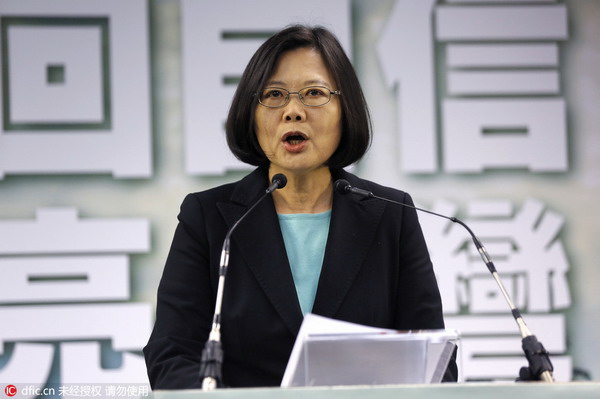Overseas media, experts voice worries over Tsai Ing-wen's equivocation
Updated: 2016-05-22 13:09
(Xinhua)
|
||||||||
 |
|
Taiwan's main opposition Democratic Progressive Party, DPP, Chairperson Tsai Ing-wen speaks during a press conference in Taipei, Taiwan, Wednesday, April 15, 2015. [Photo/IC] |
BEIJING - Overseas observers and media have voiced worries over new Taiwan leader Tsai Ing-wen's failure in her inauguration speech on Friday to clearly acknowledge the 1992 Consensus on the one-China principle, the political cornerstone of cross-Strait relations.
They called on Taiwan authorities to put the well-being of people on both sides of the Taiwan Strait above all and take concrete measures to safeguard peace and stability across the Strait.
In her Friday's speech, Tsai of the Democratic Progressive Party (DPP) said she respected "the historical fact that the two institutions representing each side across the Taiwan Strait reached joint acknowledgements and common understandings in 1992 through communication and negotiations."
As the mainland and Tsai's predecessor have acknowledged, the 1992 Consensus embodies the common understanding that both sides of the Taiwan Strait uphold the one-China principle. The consensus has explicitly defined the nature of cross-Strait relations.
Nasser Abdel-Aal, professor of Chinese studies at Egypt's Ain Shams University, said Taiwan is an inalienable part of China.
"Although a small number of countries have been fanning pro-independence sentiments in Taiwan, they cannot stop the trend of cross-Strait reunification," said the expert.
He urged Taiwan's new leader to shoulder the responsibility she skirted in the speech, and acknowledge and stick to the 1992 Consensus so as to realize the stable growth of cross-Strait ties and effectively improve Taiwan's economy and people's livelihood.
Bambang Suryono, president of the Jakarta-based Nanyang ASEAN Foundation, said in an article that Tsai's ambiguous attitude in her speech has turned the favorable environment for peaceful growth of cross-Strait ties into a complex and grave situation.
He called on Taiwan authorities to acknowledge the 1992 Consensus, maintain policies on growing a peaceful and friendly cross-Strait relationship and be dedicated to the country's peaceful reunification.
Veteran strategist and retired Indian Army Lt. General Ramesh Chopra said the Taiwan situation is crucial for stability in the Asia-Pacific and is closely related to the situation in the South China Sea.
Therefore, it is very important to maintain normal political dialogue across the Strait, he said. "Any action that harms cross-Strait relations and stability in the Taiwan Strait would be detrimental."
Xulio Rios, director of the Spanish Observatory of Chinese Politics, said in an article that the new Taiwan leader's failure to be clear on the nature of cross-Strait relations has sparked worries, urging Tsai to properly handle this issue.
Chun Ka-lim, a Chinese affairs professor at South Korea's Hoseo University, said that Tsai's ambiguity and equivocation will have a negative impact and that she, as the new Taiwan leader and chairperson of the DPP, should clarify her stance on relevant issues.
Zheng Yongnian, director of East Asian Institute of the National University of Singapore, said that by skirting the 1992 Consensus, Tsai is actually leaning toward the ideology and political ideas of gradual independence.
"You need to keep an eye on this," Zheng said.
Russia's Tass news agency quoted observers as saying that the rise to power of the new Taiwan leader, who has been opposed to closer cross-Strait ties, will make cross-Strait relations more complicated and unpredictable.
Nouvelles D'Europe, a France-based Chinese newspaper, said in an opinion piece that the 1992 Consensus has been known as the political cornerstone of cross-Strait relations and represents the essential stance and bottom line of the mainland. While there may not be a conflict or war yet, any potential "cold confrontation" would be unbearable for the island's authorities or its economy, said the newspaper.
The overseas Chinese community and Chinese expatriates have also voiced their regret and worries over Tsai's inauguration address.
"Her dodgy and equivocal attitude will only push the cross-Strait relations toward unstability and turbulence, which I believe neither the Chinese outside and inside China who care about the peaceful development on both sides of the Strait nor the international community would be pleased to see," said Wu Hao, secretary-general of the Association for the Promotion of the Peaceful Reunification of China in Russia.
"Peace is a pre-requisite for the development of Taiwan. Without peace, all the talks of solving problems, shouldering responsibilities and undertaking reforms would be empty," Wu added.
The Alliance for China's Peaceful Reunification, USA, said in a statement that the new Taiwan authorities and the DPP must make a clear pledge to all the Chinese across the world so as to renew the consensus and political foundation that both sides across the Strait belong to one China. It also urged an immediate stop of all forms of activities aimed at de-sinicization or independence of the island.
Fengxiang Qiao, chairman of U.S.-China Friendship Association, said that what has happened over the past several decades shows that the cross-Strait relations have a bright future only when both sides stick to the one-China policy. So does the well-being of the people on both sides, especially that of the people on the island, he said.
All pro-Taiwan independence ideas, claims and activities are devastating for the hard-earned relations of peaceful development across the Strait and bring Taiwan to a dangerous cliff, Qiao said.
Ma Yue, president of the China Council for the Promotion of Peaceful Reunification (New York), said the 1992 Consensus is the basis of the peaceful development, communication and cooperation across the Strait, and that the many livelihood issues Tsai talked about in her speech depend on the peaceful development of cross-Strait relations.
Chen Weidong, president of Australian Association for Friends of the the Huangpu Military Academy said, the essence of the 1992 Consensus is both sides across the Strait adhere to one-China policy and strive for the reunification of the motherland. Without such a political basis and political mutual trust, the peaceful development across the Strait will inevitably be affected. So will be the interests of the Taiwan people.
"It will not work for the new Taiwan leader to skirt the core commitment that both sides belong to one China and instead attempt to fool the people on both sides of the Strait using the equivocal talk of 'maintaining the current status,'" Chen said.
- UK's Cameron warns health services, pensions could face cuts post-Brexit
- Italy's coastguard says 1,230 migrants rescued on Sunday
- Obama calls Orlando nightclub shooting an attack on all Americans
- Trump steps up campaign with his Boeing 757
- Suspected IS terrorists arrested in Germany
- Japanese boy abandoned by parents in Hokkaido forest found alive

 People in shock after Florida nightclub shooting
People in shock after Florida nightclub shooting
 Shanghai Disneyland all set for official opening on Thursday
Shanghai Disneyland all set for official opening on Thursday
 British pageantry on parade for Queen's official birthday
British pageantry on parade for Queen's official birthday
 Carrying bricks to selling carrots: Life of child laborers
Carrying bricks to selling carrots: Life of child laborers
 Graduate revisits same university spot 19 years later
Graduate revisits same university spot 19 years later
 Euro powers land in France for UEFA EURO 2016
Euro powers land in France for UEFA EURO 2016
 The most unusualgaokao candidates in 2016
The most unusualgaokao candidates in 2016
 Elderly man carries on 1000-year old dragon boat craft
Elderly man carries on 1000-year old dragon boat craft
Most Viewed
Editor's Picks

|

|

|

|

|

|
Today's Top News
Abe's blame game reveals his policies failing to get results
Ending wildlife trafficking must be policy priority in Asia
Effects of supply-side reform take time to be seen
Chinese State Councilor Yang Jiechi to meet Kerry
Chinese stocks surge on back of MSCI rumors
Liang avoids jail in shooting death
China's finance minister addresses ratings downgrade
Duke alumni visit Chinese Embassy
US Weekly

|

|





